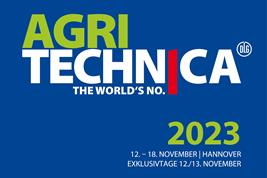03.11.2023

Two ZALF projects will be present at the Agritechnica in Hannover from November 12th to 18th. Visitors can find the project DAKIS - Digital Knowledge & Information System for Agriculture in hall 24. In Hall 11, the CarbonTillage project will provide information about an innovative soil tillage system that is designed to both secure yields and protect the climate.
DAKIS will be present as a consortium of the BMBF funding line "Agricultural Systems of the Future" together with the coordination office and the other consortia NOcsPS and GreenGrass in Hall 24, Stand A21 (Campus & Career area). Visitors can learn more about the work of the consortia and research in sustainable agriculture and food at an interactive multi-touch table.
The DAKIS project will present digital tools for agriculture and demonstrate how the project's research team is using drones, sensors and sensor networks to collect comprehensive data for a digital support system for farmers. In addition, visitors can learn about the EROSPOT project, a 3D model that helps locate erosion-prone areas in the landscape and take preventative measures.
On Friday, November 17, from 12:00 to 12:50 p.m., the consortia will take part in a panel discussion on the DLG Studio Stage in the Campus & Career area. Under the title "Agricultural systems of the future - innovative visions for area-based systems", the discussion will focus on solutions for area-efficient forms of production that can reduce conflicts of interest in the production and use of food in rural and urban areas.
The CarbonTillage project in cooperation with LEMKEN will be presented at stand 43 in hall 11. In the project, the Carbon Farming-plough is being developed to series maturity and its impact on yields, the environment and the climate is being investigated. The special characteristic of the CF-plough is the shaft-wise exchange of topsoil and subsoil, which not only sustainably breaks up compaction, increases yields and soil fertility, but also increases the sequestration of carbon in arable soils.
Further information:
